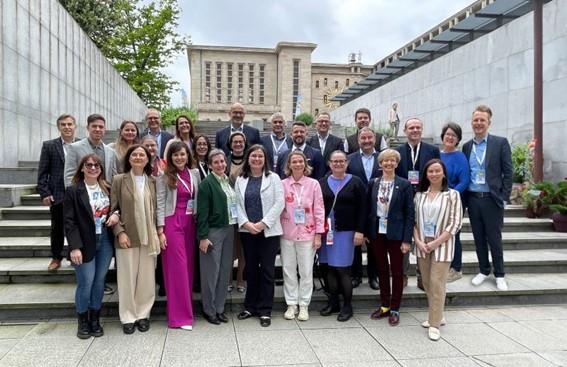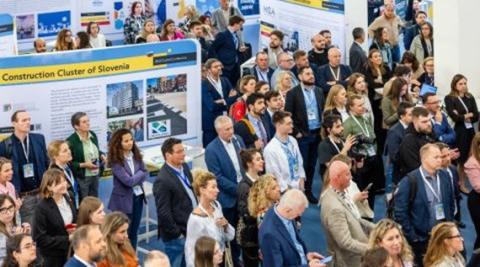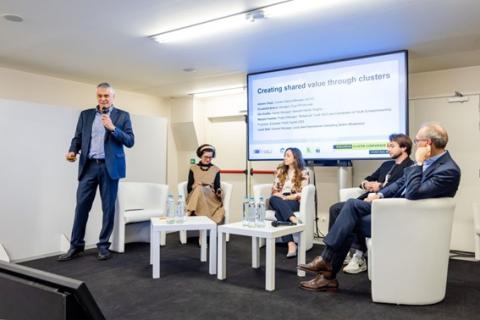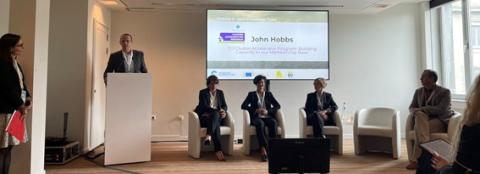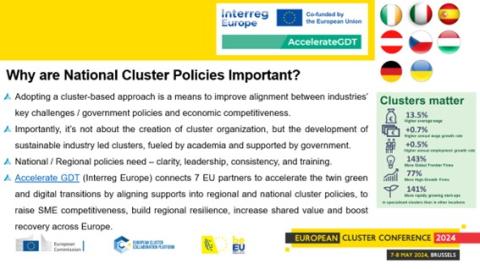Accelerate GDT @ European Cluster Conference 2024
Accelerate GDT partners and stakeholders, including MTU, ACCIÓ, CzechInvest and TCI Network met in Brussels at the 9th European Cluster Conference, organised by the European Commission and ECCP from the 6th to 8th of May 2024.
The event brought together more than 700 cluster experts from over 40 countries, to discuss what cluster policy is needed to make Europe a world leader in priority topics such as green and digital transitions and resilience building, whilst providing a deep dive into key drivers like skills, funding, and technology. With 56 speakers sharing their expertise, a mix of 800 formal and informal meetings, the conference served as a dynamic platform for fostering meaningful connections and catalysing innovation across industrial ecosystems.
The conference commenced by hosting two side events, focused on EU cluster partnerships (Euroclusters) and national cluster associations/networks. Here, EU cluster representatives highlighted the pivotal role clusters play in navigating the evolving landscape of today's economy. Central to the discourse was the indispensable role of cluster policies and networks in propelling Europe towards a greener, more digital, and resilient future.
Accelerate GDT partners took the opportunity to participate in inspiring workshops, fruitful meetings and, excellent options for networking.
Alberto Pezzi, Clusters Senior Manager at ACCIÓ also presented at ECC 2024, during a panel session entitled, “Creating shared value through clusters.” Shared value is a competitive strategy that aligns very well with clustering, as it creates value both in terms of social and economic value. Shared value is created by clusters working on developing new products, redefining productivity in value chains and building supportive environments for skills development.
Dr John Hobbs, MTU, was invited to speak on the 6th of May national cluster associations and networks on the skills needs of cluster managers to effectively support their members, where he presented the TCI Cluster Accelerator Programme.
On the 7th of May Dr Hobbs was subsequently invited to speak to a Working Group of the European Commission on Competitiveness and Growth. The group is comprised of Director Generals of the ministries of economy, industry, or competitiveness of EU member states. The high-level group: provides guidance and advice on horizontal issues relating to competitiveness and growth; to identify and discuss policy priorities and options and promote the exchange of information and best practices. Dr Hobbs was tasked with explaining the importance of national cluster policies. He shared evidence from Accelerate GDT, showcasing how cluster policies through the project are evolving to have further impact and integrate supports for Green and Digital transitions.
From Accelerate GDT’s perspective it was interesting to hear Jan-Philipp Kramer’s (Team Leader, Data and Policy at the European Cluster Collaboration Platform) intervention where he presented the key findings from the forthcoming European Cluster Panorama Report 2024. Jan-Philipp provided insights into:
- Why Clusters Matter: our analysis clearly underlines, that cluster presence is positively correlated with key dimensions of competitiveness such as human capital in tech, patents, R&D investments. Even more so, our evidence shows that strong cluster presence relates positively to digital readiness and partially green readiness of our economy.
- What we can build on: The EU has developed a unique cluster ecosystem over the past 20+ years, with over 1,200 cluster organizations, representing 170,000 firms spanning across all EU Member States and regions. This is a unique asset that can be utilised much further.
- What role has policy: Dedicated cluster policy does its part, from initiating cluster management, supporting cluster excellence to fostering cross-cluster collaboration - with seed funding, base or project funding, facilitating cluster business models.
Furthermore, Christian Ketels (Stockholm School of Economics) suggested “(we) need new forms of cooperation and that is expressed in the clusters and their cooperation. It is a real challenge because only a few recognise the problem-solving expertise of clusters.” Emphasising clusters as solution-driven entities, Ketels advocated for unified engagement with policymakers to position clusters not only as funding recipients but as strategic partners in navigating complex challenges and effecting transformative change. Affirming, one of the key takeaways from ECC 2024 is that clusters boost regional competitiveness and create dynamism and concrete value, hence it is imperative to better leverage the strategic role of clusters and connect them to broader national and EU industrial policies.
